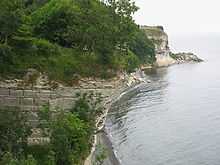Stevns Municipality
| Stevns Municipality Stevns Kommune | ||
|---|---|---|
| Municipality | ||
| ||
 | ||
| Country | Denmark | |
| Region | Region Zealand | |
| Seat | Store Heddinge | |
| Government | ||
| • Mayor | Poul Arne Nielsen (V) | |
| Area | ||
| • Total | 250.19 km2 (96.60 sq mi) | |
| Population (1 January 1 2012) | ||
| • Total | 21,864 | |
| • Density | 87/km2 (230/sq mi) | |
| Time zone | CET (UTC+1) | |
| • Summer (DST) | CEST (UTC+2) | |
| Municipal code | 336 | |
| Website | www.stevns.dk | |
.JPG)
Stevns is a municipality (Danish, kommune) in Region Sjælland on the southeast coast of the island of Zealand (Sjælland) in south Denmark. The municipality covers an area of 247 square kilometres (95 sq mi), and has a total population of 21,892 (2008). Its mayor is Paul Arne Sørensen, a member of the Venstre (Liberal Party) political party. The municipality covers most of Stevns Peninsula.
The third largest town and the site of its municipal council is the town of Hårlev.
On January 1, 2007 Stevns municipality, as the result of Kommunalreformen ("The Municipal Reform" of 2007), merged with Vallø municipality to form an enlarged Stevns municipality.
Urban areas
The ten largest urban areas in the municipality are:
| # | Locality | Population |
|---|---|---|
| 1 | Strøby Egede | 3,907 |
| 2 | Store Heddinge | 3,327 |
| 3 | Hårlev | 2.516 |
| 4 | Rødvig | 1.643 |
| 5 | Valløby | 756 |
| 6 | Strøby | 669 |
| 7 | Hellested | 613 |
| 8 | Klippinge | 517 |
| 9 | Magleby | 322 |
| 10 | Lyderslev | 317 |
The town of Store Heddinge
The town of Store Heddinge came into existence during the 13th century, and Saint Katharina Church (Sct. Katharina kirke) is also from that time. The town received privileged status as a merchant town in 1441. A Latin preparatory school was founded in the town in 1620, but was closed down in 1739.
Attractions
The area is known for its white chalk cliffs, which are quite rare in Denmark. Stevns Klint (Stevns' Cliffs) is one of these, and it is a popular attraction. The old town church by the small village of Højerup collapsed partially over the cliffs in 1928 due to erosion.
The cliffs at Højerup is also the place where the father-and-son team of scientists Luis and Walter Alvarez measured[1] the highest level of Iridium in the Cretaceous–Paleogene boundary layer, which led them to propose their hypothesis that the Cretaceous–Paleogene extinction event was caused by an impact of a large asteroid 66 million years ago.
In 2008 Cold War Museum Stevns Fortress opened to the public. It features a large exhibition of military equipment and a 1.5-hour guided tour in the large underground system of the fortress. The underground system of the fortress features 1.6 kilometres (0.99 mi) tunnels, living quarters, command centers, hospital and even a chapel. Also two ammunition deposits for its two 15 centimetres (5.9 in) cannons. The tunnels are 18–20 metres (59–66 ft) below surface excavated in the chalk of Stevns. This top secret fortress was built in 1953 and remained operational until 2000.
Stevns is also home to Elverhøj (Elves' Hill), while not much of an attraction, it is famous for the fairy tale The Elf Mound by H.C. Andersen and the Danish national play Elves' Hill, both of which in Danish share the name Elverhøj.
Image gallery
-

Stevns Klint
-

St. Catherine's Church, Store Heddinge
References
- ↑ Alvarez, Luis W.; Alvarez, Walter; Asaro, Frank; Michel, Helen V. (June 6, 1980). "Extraterrestrial cause for the Cretaceous–Tertiary extinction". Science 208 (4448): 1095–1108. doi:10.1126/science.208.4448.1095. PMID 17783054. CiteSeerX: 10.1.1.126.8496.
- Municipal statistics: NetBorger Kommunefakta, delivered from KMD aka Kommunedata (Municipal Data)
- Municipal mergers and neighbors: Eniro new municipalities map
External links
| Wikimedia Commons has media related to Stevns Kommune. |
| |||||
| |||||||||||||||||||||||
Coordinates: 55°20′N 12°19′E / 55.333°N 12.317°E



